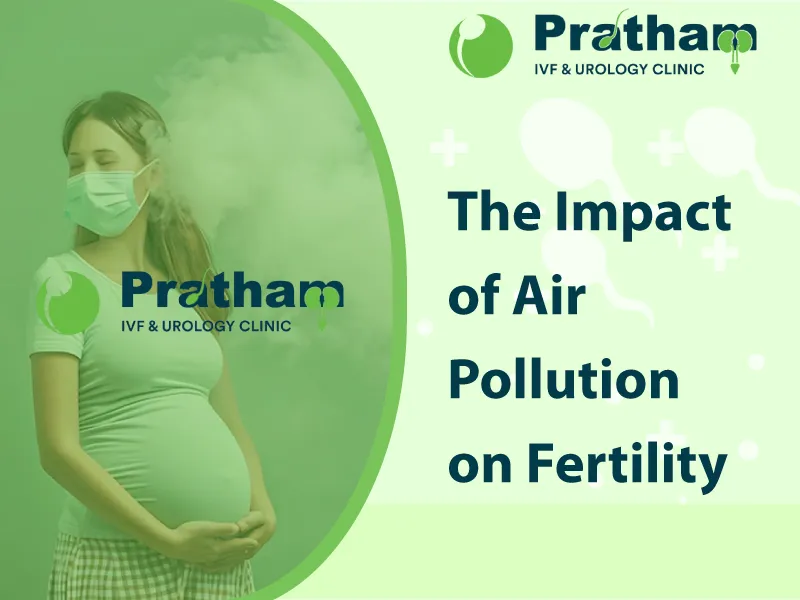
Air pollution is a growing global concern affecting millions of people. While most discussions focus on respiratory diseases and cardiovascular problems, fewer people realize that air pollution impacts fertility as well. Research suggests that prolonged exposure to air pollution can negatively affect reproductive health in both men and women, leading to decreased sperm quality, hormonal imbalances, and increased pregnancy complications.
If you are struggling to conceive, you may wonder whether environmental factors like air pollution are playing a role in your fertility journey. In this blog, we will explore the connection between air pollution and fertility, how pollutants harm reproductive health, and what steps you can take to protect yourself.
How Does Air Pollution Affect Fertility?
Air pollution consists of tiny particles and harmful gases released from industrial activities, vehicles, and household pollutants. The main pollutants that contribute to fertility issues include:
- Particulate Matter (PM2.5 and PM10) – Tiny airborne particles that penetrate deep into the body and disrupt reproductive hormones.
- Nitrogen Dioxide (NO2) – Commonly released from car exhaust and factories, linked to decreased ovarian function.
- Carbon Monoxide (CO) – Reduces oxygen supply to reproductive organs, affecting sperm and egg quality.
- Sulfur Dioxide (SO2) – Found in industrial emissions, associated with increased pregnancy complications.
- Endocrine-Disrupting Chemicals (EDCs) – Found in air pollutants, plastics, and pesticides, leading to hormonal imbalances.
These pollutants can affect fertility by interfering with hormone production, damaging reproductive cells, and increasing the risk of miscarriage and pregnancy complications.
The Effect of Air Pollution on Female Fertility
Women’s reproductive health is highly sensitive to environmental factors. Air pollution impacts fertility by disrupting the menstrual cycle, affecting ovarian function, and increasing the risk of pregnancy complications.
- Disrupted Menstrual Cycle – Exposure to air pollution can cause irregular menstrual cycles due to hormonal imbalances. Pollutants like PM2.5 and NO2 interfere with estrogen and progesterone levels, leading to delayed ovulation and reduced fertility.
- Decreased Ovarian Reserve – Studies show that women exposed to high levels of air pollution have lower Anti-Müllerian Hormone (AMH) levels, which indicates a decline in ovarian reserve. Lower AMH levels mean fewer eggs available for conception.
- Increased Risk of Miscarriage – Pregnant women living in polluted areas have a higher risk of miscarriage and stillbirth due to oxygen deprivation and inflammation caused by toxic particles in the air.
- Higher Chances of Pregnancy Complications – Long-term exposure to air pollution is linked to gestational hypertension, low birth weight, and preterm birth.
The Effect of Air Pollution on Male Fertility
Men’s reproductive health is also at risk due to air pollution. Studies show that pollutants damage sperm quality, reduce testosterone levels, and affect overall fertility.
- Poor Sperm Quality – Men exposed to air pollution often have lower sperm count, poor motility, and increased DNA fragmentation.
- Hormonal Imbalances – Pollutants disrupt testosterone production, essential for sperm development.
- Increased Oxidative Stress – Air pollution triggers oxidative stress, damaging sperm DNA and reducing fertility.
How Air Pollution Affects IVF Success Rates
If you are undergoing IVF treatment, exposure to air pollution may lower your chances of success. Research shows that women exposed to high pollution levels have :
- Lower Egg Retrieval Success
- Reduced Embryo Quality
- Higher Chances of Early Pregnancy Loss
For couples struggling with infertility, minimizing exposure to air pollution can improve IVF outcomes.
Ways to Reduce the Impact of Air Pollution on Fertility
While it may not be possible to completely avoid air pollution, you can take steps to protect your fertility:
- Use Air Purifiers at Home – Invest in a HEPA air purifier to reduce indoor pollution.
- Avoid Outdoor Pollution Exposure –
- Stay indoors during peak traffic hours
- Avoid jogging or exercising near roads with heavy vehicle emissions.
- Use N95 masks when traveling in polluted areas.
- Eat a Fertility-Boosting Diet – Consume antioxidant-rich foods like :
- Leafy greens
- Nuts and seeds
- Citrus fruits
- Fatty fish (rich in Omega-3)
- Stay Hydrated – Drink plenty of water to flush out toxins.
- Reduce Exposure to Household Pollutants –
- Avoid chemical-based air fresheners and cleaners
- Use natural cleaning products like baking soda and vinegar.
- Ventilate your home to prevent indoor air pollution buildup.
Why Choose Pratham IVF?
At Pratham IVF, we understand that fertility challenges can be influenced by environmental factors like air pollution. Our clinic provides advanced reproductive care with state-of-the-art technology and air-purified IVF labs to improve embryo quality. Our team of experienced fertility specialists offers personalized treatment plans to help couples overcome the effects of air pollution on fertility. We focus on patient care, innovation, and ethical fertility treatments, ensuring that every couple has the best chance of achieving a successful pregnancy.
Conclusion
The link between air pollution and fertility is a growing concern. From hormonal imbalances to poor sperm quality and pregnancy complications, air pollution can significantly impact reproductive health. While avoiding pollution completely is difficult, taking proactive measures, such as using air purifiers, maintaining a healthy diet, and seeking fertility treatment in clean environments can improve your chances of conception. If you are struggling with infertility and suspect environmental factors like air pollution are affecting your reproductive health, consult with fertility experts to explore your options.
Worried about air pollution affecting your fertility? Contact Pratham IVF today! Call +91 9879780105 or email prathamivf@gmail.com for expert fertility guidance and treatment.
 Ahmedabad Top Rated IVF Center
Ahmedabad Top Rated IVF Center




